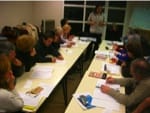Nice-Premium: Hello, Jean Pierre. So here you are on the web pages of Nice Premium for a little interview, but really how and when did your passion for Niçard, the Provençal language, begin?
Jean Pierre Spiès: It’s always been there, but from a distance. I listened to the language with pleasure, without knowing how to speak it, and without really knowing it.
N-P: Is there a connection with your family?
J-P S: Yes, the elders spoke Niçard, but from one generation (between two wars), they stopped passing it on. It was the mother tongue for my grandparents, but my parents do not speak it. I liked reading texts in Occitan. I always said: “I understand Niçard, but I don’t speak it!” I decided to go further and really learn it.
N-P: Why this language and not another?
J-P S: I’ve practiced quite a few languages, without really delving into them. But this one, I feel it singing inside me, I feel like it comes from very far and allows me to express the light of the land and the warmth of relationships. Also, I feel that this language carries a spirit of openness, of tolerance, which has been transmitted to us since the troubadours who, in a way, invented respect for others.
N-P: Moreover, should we make a distinction between Niçard and Provençal language?
J-P S: It’s the same language, spoken over a very vast territory, 33 departments in France, from Alpine valleys in Italian territory to the Val d’Aran in Spanish territory. It’s called Occitan, langue d’oc, or—it has been its common name for centuries—Provençal. This language is not uniform throughout this area; there are several dialects and variations from one place to another; but these differences do not prevent speakers from understanding each other, a Niçard from the coast understands a speaker from Contes or Grasse without difficulty, even if their speech has some differences in pronunciation or verb forms. I was surprised by all the similarities between Niçard and Auvergnat, spoken in the village of my paternal grandmother between Aurillac and Quercy, and by the richness of the language in reading texts from all the dialects. Niçard has its peculiarities which are strong and by them, it differs from Provençal.
N-P: From student to teacher today, how do you change “hats”?
J-P S: I enjoyed participating in Jean-Pierre Baquié’s classes, it was very friendly. And then when he asked me to take the class in his place when he organized another course in Nice, I naturally agreed to replace him. It’s a pleasure to share what I’ve learned.
N-P: How do you teach it?
J-P S: The goal is to learn to speak, read, and write the language at the same time. For this, the classes are “interactive”; we learn together, everyone shares what they know with others, some know proverbs, another has heard this in his family, the memory of a forgotten word comes back… My task is to encourage exchange, to bring texts, situations. I give notions of grammar, syntax but at the same time, during these classes, I also learn a lot from the students. And then conviviality is also expressed when we share a glass of friendship at the end of a class, as last week to celebrate the kings!
N-P: Besides teaching this language, any other activities?
J-P S: My professional activity is already very demanding and time-consuming. I also run a theater workshop in Niçard, and then I do not neglect family life.
N-P: The kitchen, right?
J-P S: Yes, it’s a real pleasure to make good dishes. I like using vegetables, fruits, peeling, cutting, kneading, spending time preparing all that. Plus, what is made “from scratch” is even better! It’s an everyday activity, and also a relaxation.
N-P: An encounter that has marked you since you know Niçard?
J-P S: Many encounters, especially! With authors, singers, Mauris who has been singing in Niçard for decades and moves from class to class teaching children songs in Niçard for the Carnival; and then all the people who, every day, respond to a “bònjorn” or an “alora”! That’s what a language is for!
N-P: What does it bring you?
J-P S: Pleasure.
N-P: Can one learn at any age?
J-P S: Of course!
N-P: An anecdote?
J-P S: My sister left Nice more than thirty years ago. She does not speak Niçard. One day, one of my sons was at her place, in Lyon. At one point, while they were talking at the table about looking for something, he said, “It’s in the charaf up there!” My sister replied mechanically: “Then, let’s find it!” All the cousins looked at each other wondering what they were talking about! They realized that it was a Niçard word they all had in common, without thinking about it. By talking, we use many Niçard words every day without paying attention to it. It’s a richness that needs to be known, preserved, and shared. Transmitting the language is a way to keep this wealth and to foster exchange and communication.
Alora!! Are you tempted to make this southern language sing in your voice?
Know that the course is led by Jean-Pierre Spiès and it takes place every Thursday from 8:30 AM to 8:00 PM at the judo hall behind the Drap gymnasium. To follow the courses given in Drap – Annual subscription: 20 euros.
Website: [Http://ieo06.free.fr](Http://ieo06.free.fr)


